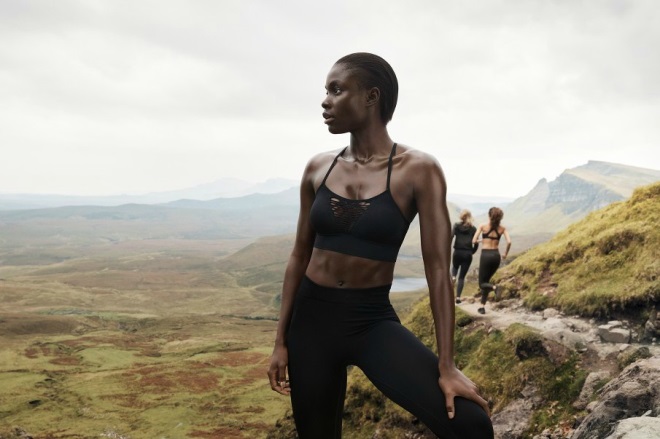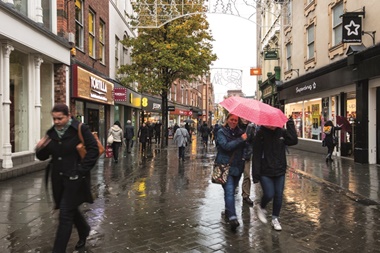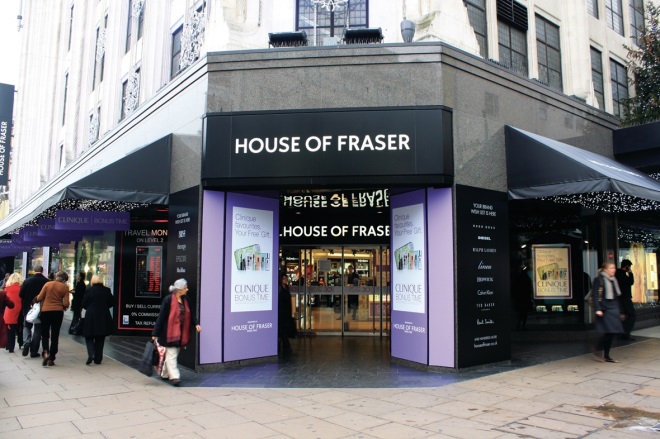Winners
Boohoo Group

Boohoo’s spring 18 collection
Boohoo Group’s clear understanding of its customer – young, fashion forward, digitally native, social, and price aware – continued to pay off in 2018. Under the group’s umbrella sit Boohoo, BoohooMan and PrettyLittleThing. Collectively, their revenue soared by 50% to £395.3m for the six months to 31 August, as pre-tax profit increased 22% to £24.7m.
PrettyLittleThing, which was set up by Umar Kamani, son of Boohoo Group co-founder Mahmud Kamani, hit a sweet spot in a crowded market this year to enjoy a meteoric rise. Sales in the six months to 31 August climbed 132% to £168.6m. John Stevenson of city broker Peel Hunt told Drapers the brand could be set to “outgrow Boohoo in a couple of years”.
Meanwhile, BoohooMan launched savvy collaborations with influencers such as US rapper French Montana and footballer Dele Alli, capitalising on the power of social media marketing.
Boohoo Group is also leading the way in technological innovation, and invested in fashion technology showroom start-up RangeRoom during the year.
Joint CEOs Carol Kane and Mahmud Kamani picked up the Drapers Award for Fashion Leaders of the Year in November. The pair will shift into new roles in March 2019, Kamani as group chief executive chairman and Kane as executive director. Replacing them in the CEO role will be John Lyttle, chief operating officer at Primark.
The gym kings

Gymshark founder Steve Cook
The athleisure movement continued to bring sports apparel out of the gym and into consumers’ everyday lives this year. This was boosted by popular reality TV shows The Only Way Is Essex, Made in Chelsea and Love Island, which showed cast members working out.
Sportswear brands Gymshark and Gym King were among those to capture the attention of this generation of social media driven, trend-led fitness consumers.
Gymshark has built a highly engaged following of 16-to-25-year-olds through its network of influencers. Ben Francis, the founder of the business, was named one of Drapers’ 30 Under 30 stars of the future this year, and the businesss was later crowned 12th on the list of Britain’s private companies with the fastest-growing sales.
The stats are impressive, with sales of £103m in the year to 31 July 2018, up 127.8% over the last three years. The brand took home the award for Best Pureplay Etailer – Turnover Under £50m at the Drapers Digital Awards.
Gym King, meanwhile, picked up the award for Young Fashion Brand of the Year at the Drapers Awards in November, with judges praising the brand for its strategic focus and strong figures, having spotted a gap in the market for “smart athleisure”.
Sustainability

H&M
2018 saw a shift in the attitudes of big brands and retailers towards sustainability. Many committed to using alternative materials, tackling ethical trading and reducing waste and pollution.
On its current growth path, the global fashion industry could use more than a quarter of the world’s annual carbon budget by 2050, the Ellen MacArthur Foundation found. Burberry, Guess, Inditex, and H&M were among 40 fashion leaders who launched the Fashion Industry Charter for Climate Action in December, to address the industry’s environmental impact. The charter recommended solutions such as the decarbonisation of production, using climate-friendly materials, low-carbon transport and circular business models.
Action is taking place across the industry, and the government is also making sustainability a priority. In November, Boohoo Group, Asos and Missguided were invited to defend their encouragement of consumer buying patterns in parliament. Mary Creagh MP said: “Fashion shouldn’t cost the earth. But the way we design, make and discard clothes has a huge environmental impact.”
During the hearing, Asos CEO Nick Beighton said: “Unless we demonstrate responsible behaviour, our customers will buy less from us.”
Alongside initiatives encouraging more sustainable production, consumer habits are also showing signs of changing to a more sustainable focus. Resale sites have been steadily gaining momentum to bring the circular economy into the mainstream. The resale market will be worth $33bn (£25.1bn) globally by 2021, predicts analyst Fung Global Retail & Technology.
In November, H&M picked up the Sustainability Award at the Drapers Awards. Judges were impressed by its sustainability strategy, which they said was “fully embedded” in the business.
Losers
The high street

2018 brought an unprecedented wave of store closures, job losses, restructurings and administrations on the UK high street, leaving big-name retailers battling for survival.
An estimated 93,000 UK retail jobs were lost in 2018, the British Retail Consortium reported. One high street chairman told Drapers he thought it would take “a minimum of five years before it improves”.
It was a particularly difficult year for department stores, which were forced to slim down their portfolios in response to tumbling sales. Aside from the well-document problems facing House of Fraser (below), Debenhams struggled under tough high street conditions. In April, CEO Sergio Bucher admitted its clothing offer “wasn’t good enough”, and the retailer slashed a raft of senior and director level roles. In October it revealed plans to axe up to 50 underperforming stores in a bid to turn around its ailing fortunes.
However, Debenhams and House of Fraser were not the only bricks-and-mortar retailers to struggle. Marks & Spencer announced it would close 100 of its less successful stores over the next four years and moves more of the business online, while New Look and Mothercare are also set to close stores through company voluntary arrangements (CVAs).
Drastic Black Friday discounts failed to attract shoppers to the high street, and consumer spending dropped by 0.7% year on year in November. Clothing and footwear retailers were hit particularly hard, suffering a 2.8% drop in sales. High street retailers are bracing for Christmas trade to be worse than last year, as economic uncertainty from the potential impact of Brexit prevails.
House of Fraser

House of Fraser’s fall into administration dominated the headlines this year. The extent of the problems facing the department store chain became clear when it announced a CVA in June.
Mike Ashley’s Sports Direct acquired House of Fraserout of administration in August for £90m. After sacking its entire senior management team, Ashley called for an investigation into House of Fraser’s collapse. He claimed the House of Fraser board “totally misled” suppliers, XPO Logistics and warehouse operators. A report by administrator EY revealed House of Fraser had debts totalling £484m, including £30.4m owed to XPO Logistics.
It was originally thought that the ailing chain would be reduced to just 28 stores. However, Ashley vowed to keep at least 47 of its 59 stores open pending negotiations with landlords.
However, many brands supplying House of Fraser were spooked, and delayed a commitment to spring orders because of continuing uncertainty about store closures. The chief executive of one concession brand told Drapers: “We don’t know what’s happening with the stores and it’s unfair for us to have to take the hit for that.”
Inappropriate workplace ‘banter’
2018 was haunted by #metoo allegations against some of the biggest names in fashion retail.
In November, Arcadia Group chairman Sir Philip Green was named in parliament as the businessman at the centre of allegations about inappropriate conduct, including sexual harrassment and racist remarks. Green denied any wrongdoing and said he had only indulged in “banter” with his staff. However, the allegations sparked calls for him to be stripped of his knighthood, as well as for a crackdown on the use of non-disclosure agreements to stop staff publicly exposing inappropriate behaviour.
Then, in early December, Ted Baker founder and CEO Ray Kelvin took a temporary leave of absence following allegations of “forced hugging” in the office. An online petition reportedly signed by members of staff claimed that Kelvin asked “young female members of staff to sit on his knee” and made “sexual innuendos”. The company has launched an independent investigation to look into the claims.
It comes after Guess co-founder Paul Marciano and Lululemon CEO Laurent Potdevin both stepped down following allegations over their professional conduct.

